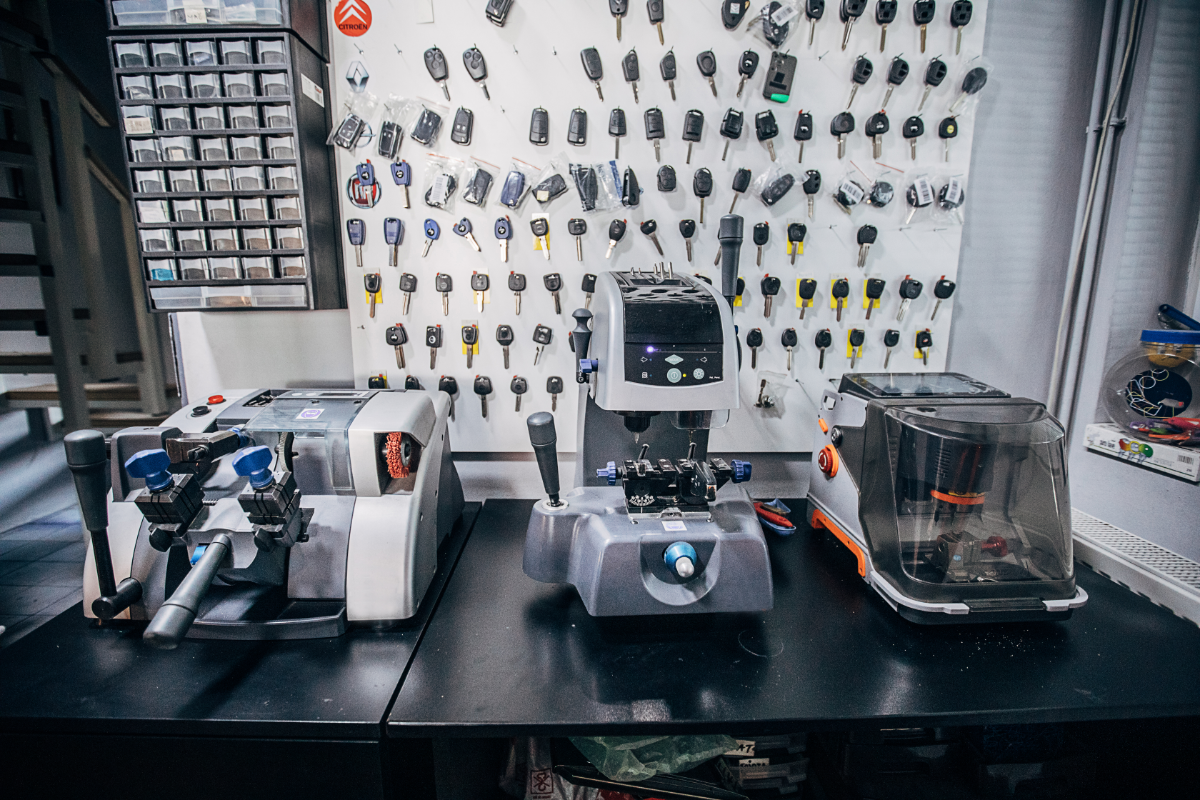Locksmithing, once a trade focused solely on mechanical locks and keys, has dramatically evolved in recent years. With the advent of advanced security technologies, locksmiths now encounter an array of sophisticated systems that extend beyond traditional lock-and-key mechanisms. Digital locks, biometric systems, and smart home integrations have become commonplace, transforming the landscape of locksmithing into a complex and multifaceted field. This evolution demands not just an understanding of mechanical principles but also an in-depth knowledge of electronics, software, and modern security solutions.
Why Professional Development is Essential for Locksmiths
In an industry where technological advancements are constant and rapid, staying updated is not just beneficial but crucial for locksmiths. Professional development through courses and certifications provides locksmiths with the skills needed to navigate new technologies, ensuring they can offer cutting-edge solutions to their clients.
- Keeping Pace with Technology: As new security technologies emerge, locksmiths must acquire new skills to effectively handle and repair these systems. Without ongoing education, locksmiths risk falling behind, potentially losing clients to competitors who are better equipped to handle the latest innovations.
- Enhancing Skill Sets: Professional courses and certifications provide locksmiths with specialized knowledge and techniques that are not always covered in initial training. This additional expertise can enhance their service offerings, allowing them to address a wider range of client needs and increase their marketability.
- Building Credibility and Trust: Certifications from recognized institutions not only validate a locksmith’s skills but also build trust with clients. Customers are more likely to choose a locksmith who has demonstrated a commitment to professional growth and adherence to industry standards.
- Career Advancement: For locksmiths seeking to advance their careers, additional qualifications can open doors to new opportunities, whether it’s starting a specialized business, moving into higher-paying roles, or even transitioning into related fields such as security consulting.
In summary, as the locksmithing profession continues to evolve, so too must the skills and knowledge of those who practice it. Investing in ongoing professional development ensures that locksmiths remain relevant, competitive, and capable of meeting the ever-changing demands of the security industry.
The Necessity of Continuous Training in the Locksmith Profession
Evolution of Techniques and Technologies
The locksmithing field has seen significant advancements with the integration of electronic and smart technologies into security systems. Traditional mechanical locks have been complemented by digital locks, smart locks, and biometric systems, each presenting unique challenges and opportunities. As these technologies evolve, so do the techniques required to service and repair them. Continuous training ensures that locksmiths stay updated with the latest tools, techniques, and best practices, allowing them to handle new types of locks and security systems effectively.
Impact of Changes on Service Demand
The shift towards advanced security solutions has altered the landscape of locksmith services. With the rise of smart homes and businesses, the demand for locksmiths who are proficient in these new technologies has increased. This change has led to a higher expectation for locksmiths to offer comprehensive services, from installing high-tech security systems to troubleshooting complex electronic locks. Staying current with professional development helps locksmiths meet these evolving demands and expand their service offerings.
Key Courses and Certifications Available for Locksmiths
Basic and Advanced Training Courses
Basic locksmith training courses provide the foundational skills needed for entry into the profession, covering topics such as key cutting, lock repair, and basic security principles. Advanced courses delve into more complex areas, including electronic lock systems, advanced keyway management, and forensic locksmithing. These courses are essential for locksmiths looking to enhance their expertise and tackle more sophisticated security challenges.
Recognized Industry Certifications
Certifications are crucial for validating a locksmith’s skills and knowledge. Recognized certifications such as the Certified Locksmith (CL) and Certified Master Locksmith (CML) from professional organizations like the Associated Locksmiths of America (ALOA) offer industry-wide recognition of expertise. These certifications not only enhance a locksmith’s credibility but also demonstrate a commitment to maintaining high standards of professional practice.
Online vs. In-Person Training Programs
Locksmith training programs are available both online and in-person, each offering distinct advantages. Online programs provide flexibility, allowing locksmiths to learn at their own pace and on their own schedule. In-person training, on the other hand, offers hands-on experience and direct interaction with instructors, which can be invaluable for mastering practical skills. Choosing between these options depends on individual learning preferences, availability, and the specific skills being sought.
Benefits of Investing in Courses and Certifications
Enhancement of Technical Skills
Investing in courses and certifications directly enhances a locksmith’s technical skills, enabling them to work with the latest technologies and techniques. This improved skill set allows locksmiths to perform a wider range of services with greater precision and efficiency, ultimately benefiting their clients and their business.
Increase in Credibility and Client Trust
Certifications and advanced training build credibility and foster trust with clients. Customers are more likely to choose a locksmith who has demonstrated expertise through recognized certifications, as this assures them of the locksmith’s ability to handle complex security issues competently and professionally.
Opportunities for Professional and Business Growth
Furthering one’s education in locksmithing can open doors to various career opportunities, including specialization in niche areas or starting a business. Advanced qualifications and certifications can lead to higher-paying positions, new business ventures, or expanded service areas, contributing to overall career advancement and business success.
How to Choose the Right Course or Certification?
Criteria for Evaluating Quality
When selecting a course or certification, consider the quality and reputation of the program. Look for programs that offer comprehensive coverage of relevant topics, are accredited by reputable organizations, and have positive reviews from past participants. A well-structured program will provide both theoretical knowledge and practical skills essential for proficiency in the field.
Considerations of Cost and Time
Cost and time commitment are significant factors when choosing a training program. While more expensive or longer programs may offer more extensive training, they may also require a greater investment of time and money. Evaluate the return on investment and choose a program that aligns with your professional goals and financial situation.
Reputation and Feedback from Other Professionals
Researching the reputation of training providers and reading feedback from other locksmiths can provide valuable insights into the effectiveness of a program. Networking with industry peers and seeking recommendations can help identify reputable programs and avoid those that may not meet expectations.
Success Stories: Locksmiths Who Transformed Their Careers with Professional Development
Case Studies and Interviews with Professionals
Highlighting success stories of locksmiths who have significantly benefited from continued education can provide inspiration and practical examples. Case studies and interviews with these professionals can offer insights into how advanced training and certifications have impacted their careers, showcasing real-world applications and the tangible benefits of professional development.
The Future of the Profession and the Importance of Continuous Learning
Trends and Innovations in the Industry
As technology continues to advance, new trends and innovations in security are expected to shape the future of locksmithing. Emerging technologies such as AI-driven security systems, advanced biometric solutions, and integrated smart home technologies will likely become more prevalent, requiring locksmiths to stay informed and adaptable.
The Need to Stay Updated to Remain Competitive
To remain competitive in an evolving industry, locksmiths must commit to continuous learning and professional growth. Keeping up with industry trends, acquiring new skills, and obtaining relevant certifications will ensure that locksmiths not only meet current demands but also anticipate and adapt to future developments in the field.
Summary of the Benefits of Professional Development
Professional development is crucial in the locksmithing industry due to the rapid evolution of technologies and techniques. By investing in continuous education through courses and certifications, locksmiths can significantly enhance their technical skills, build credibility, and expand their service offerings. Updated knowledge ensures that locksmiths are proficient in handling the latest security systems, which in turn boosts client trust and satisfaction. Furthermore, advanced training opens doors to new career opportunities and business growth, positioning locksmiths as leaders in a competitive field.
How to Take the First Step Towards Updating Your Skills
Embarking on a journey of professional development begins with identifying the right resources and opportunities. Start by researching available courses and certifications that align with your career goals and areas of interest. Evaluate options based on quality, cost, and the reputation of the training providers. Networking with industry peers and seeking recommendations can also help in choosing reputable programs. Whether you opt for online learning or in-person workshops, taking the initiative to enroll in a course is the first step towards enhancing your skills and staying current in the field.
The Importance of Never Stopping Learning in the Locksmith Profession
In the dynamic field of locksmithing, the pursuit of knowledge should be a continuous process. As new technologies emerge and industry standards evolve, the need to stay informed and adapt is paramount. Embracing lifelong learning not only keeps locksmiths relevant and competitive but also ensures they can offer the best possible service to their clients. By making professional development a regular part of their career, locksmiths can remain at the forefront of their profession, ready to tackle new challenges and seize opportunities for growth. Remember, the commitment to learning is not just about staying current—it’s about thriving in a field that is constantly changing and innovating.

I’m Marcel Brandt, a locksmith with over 15 years of experience. I specialize in modern security solutions and love sharing tips to help fellow locksmiths succeed in their careers.




